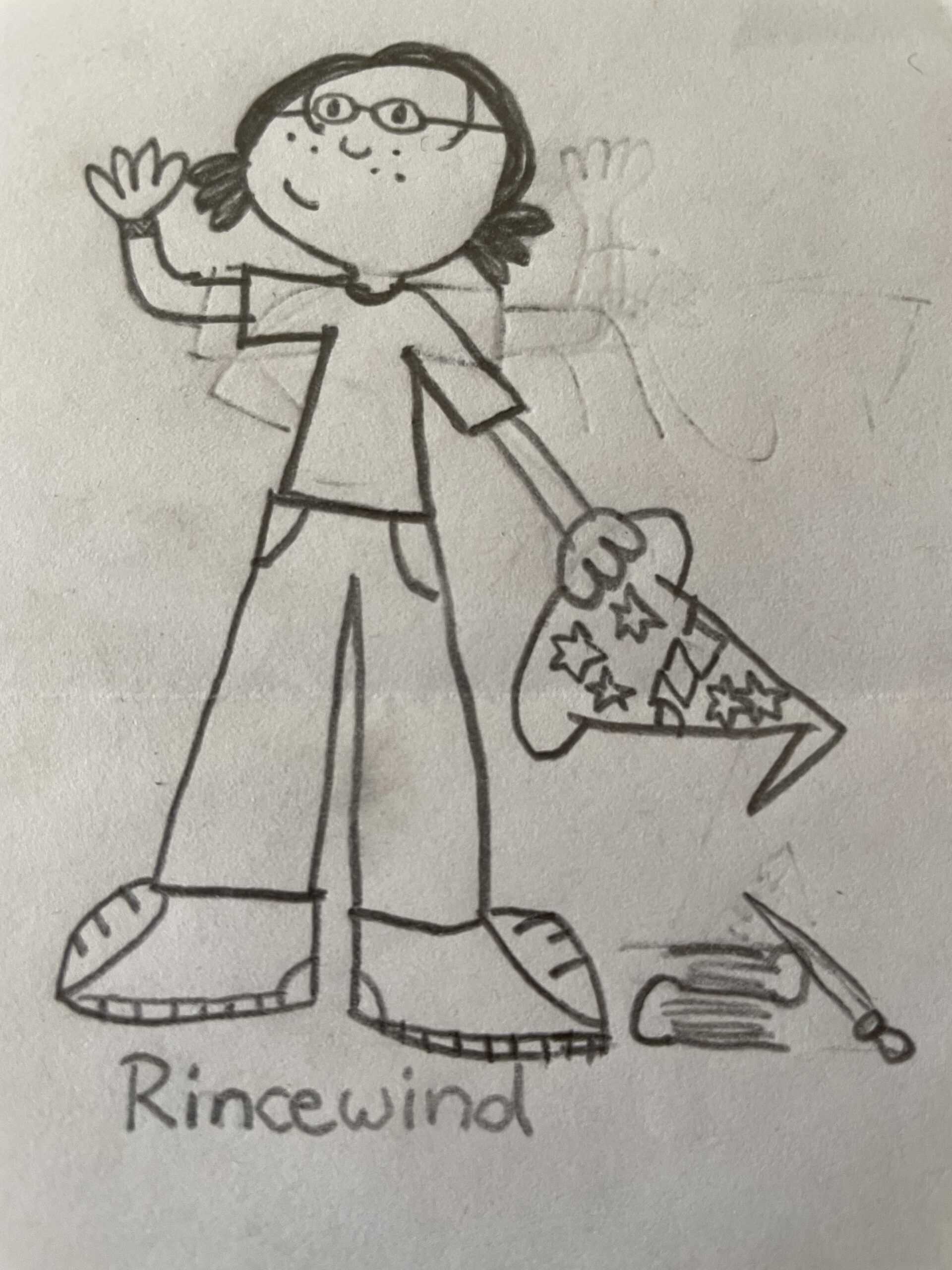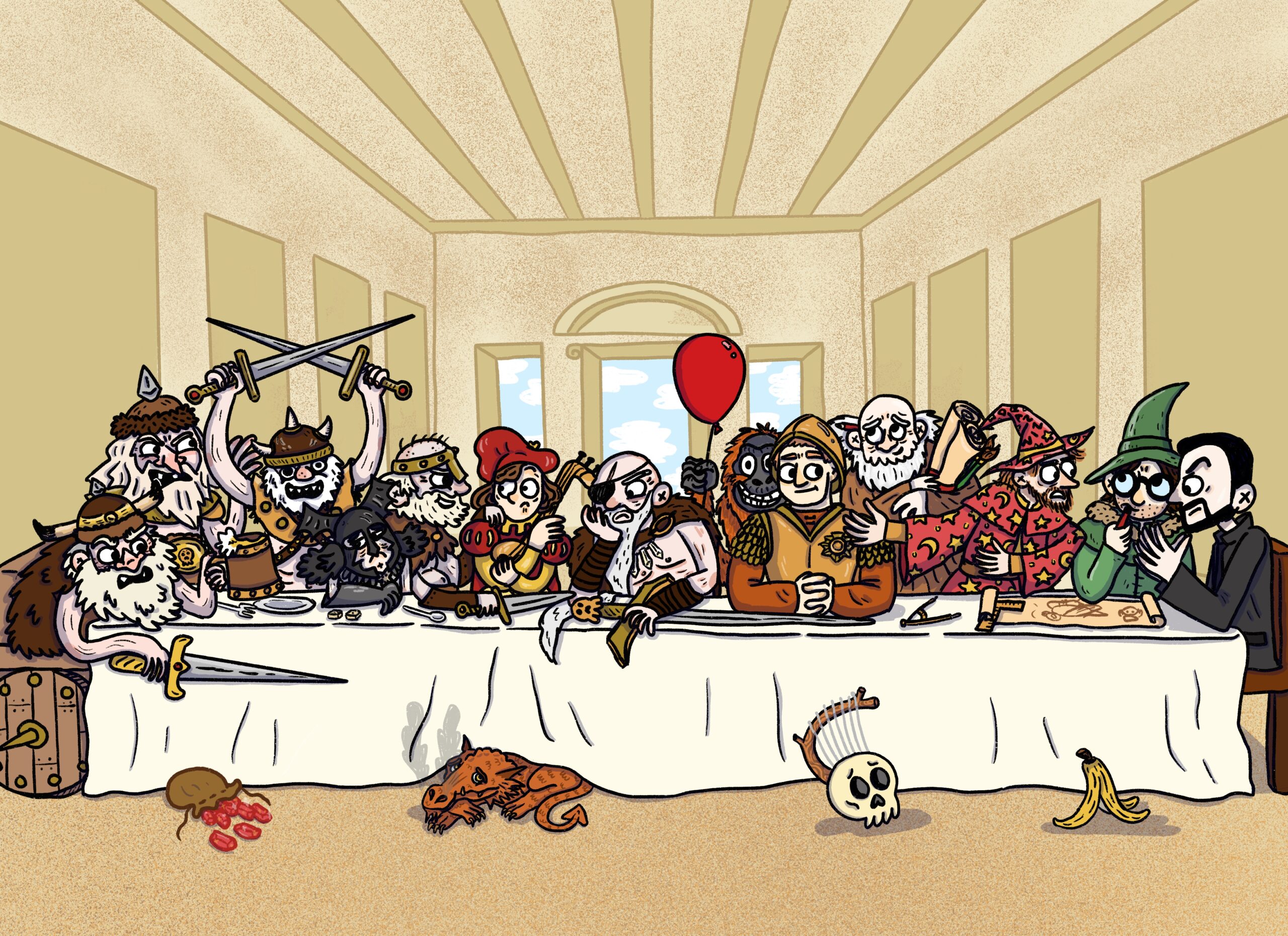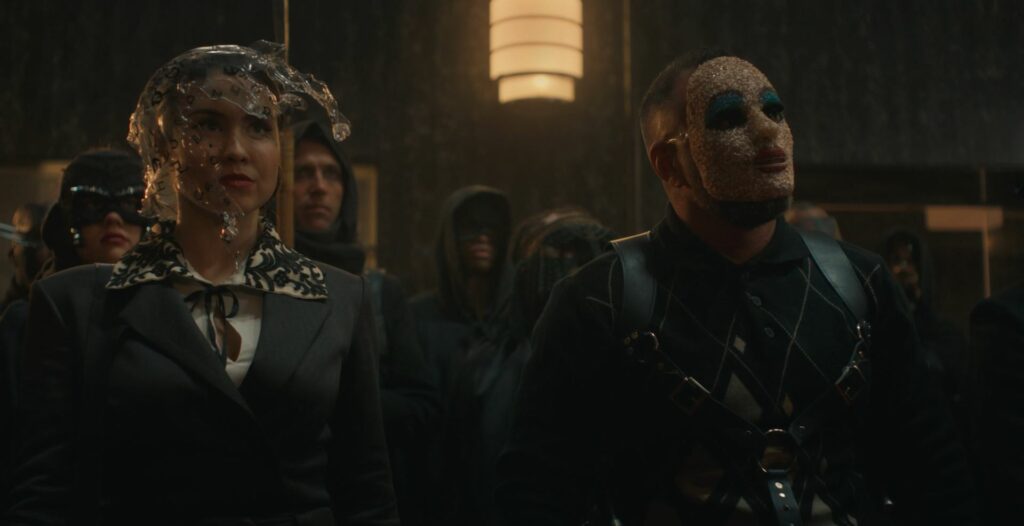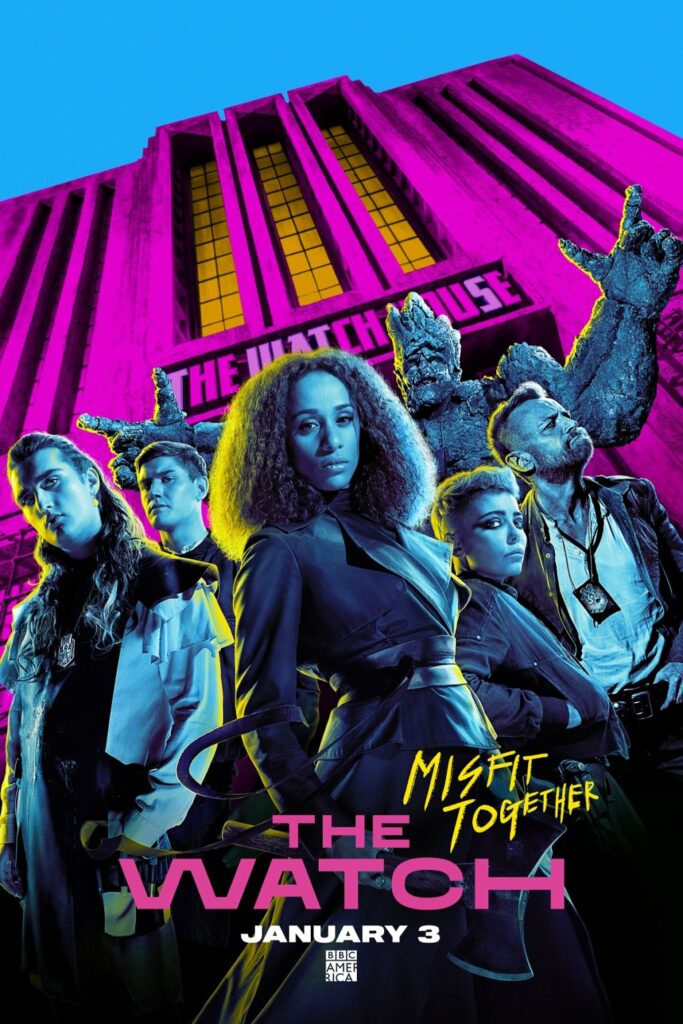These are the episode notes and errata for our special Glorious 25th of May episode, “Eeek Club 2022“, discussing topics chosen by our Eeek tier subscribers.
Iconographic Evidence
We’ll add a photo of the enormous Senate ballot paper from the 2013 election as soon as we can find one!
Notes and Errata
- We’ll find the “buckle up as I teach you about something I just learned myself!” tweet at some point, but it’s eluded us for the moment. (Let us know if you find it!)
- You can find the biggest Democracy Sausage project at democracysausage.org or on Twitter at @DemSausage. Note that this project is not, In any meaningful way “official”, but it’s an impressive effort nonetheless. We’d also make the comment that while the democracy sausage is a fun tradition, it ought not to be so universally necessary for public schools to fundraise for themselves in this way every election…
- We did indeed talk about the confluence of the Glorious 25th of May and Towel Day in last year’s Eeek Club episode.
- Our previous T-shirt ideas have been a “Sausage Inna Bunnings” design, from #Pratchat50, and the “Sausorobos” design – a sausage in a circle eating it’s “tail” – in #Pratchat53. We also considered a Helvetica names T-shirt of the Hogfather’s four boars in #Pratchat26.
- Listen Sven told us about the early, cheaply-made German editions of the Discworld books, from publisher Heyne, who inserted an ad for Maggi cup-a-soup into their version of Sorcery (and possibly other books). These were discontinued not long after Terry found out. They “wouldn’t promise not to do it again” in Terry’s words, and so they took the German publication rights to Goldmann instead.
- Our previous reflective episode, with also served to give us some breathing room at the start of the pandemic lockdowns, was #Pratchat30, “Looking Widdershins“, in April 2020.
- Our single episode overview of The Watch is #Pratchat52, “A Near-Watch Experience“.
- We mention three recent screen adaptations of Sherlock Holmes this episode:
- Sherlock (2010-2017) – the BBC “prestige” series, created by Steven Moffat and Mark Gatiss, and starring Benedict Cumberbatch and Martin Freeman as a modern-day Holmes and Watson.
- Elementary (2012-2019) – the CBS procedural crime drama, born out of a failed attempt to make a US adaptation of the BBC show. It stars Johnny Lee Miller as a modern-day Sherlock who, after becoming addicted to heroin, relocates to New York to start over. Lucy Liu plays Joan Watson, an ex-doctor and Sherlock’s assigned “sober companion” as he recovers from his addiction.
- Sherlock Holmes (2009) and Sherlock Holmes: Game of Shadows (2011) – Guy Ritchie’s film versions, set in the same time as the original stories, but with dashes of action, steampunk and occultism. Both star Robert Downey Jr as Sherlock, and Jude Law as Watson.
- The 100 (2014-2020) is an American dystopian science fiction TV series. The series is set in a future where the Earth has been devastated by nuclear war, but humans have survived in an orbiting space station, the Ark. A century after the war, one hundred “juvenile delinquents” are sentenced to a form of community service in which they are sent back to Earth to determine if it’s safe for the rest to return.
- Liz has previously written about adapting the work of one of her other favourite authors, Philip K Dick, in this piece for Kill Your Darlings magazine.
- The Hunger Games was originally a series of three novels – The Hunger Games, Catching Fire and Mockingjay – by American author Suzanne Collins, published between 2008 and 2010, with a prequel, The Ballad of Songbirds and Snakes, published in 2020. The original trilogy was adapted into four films – the last book in two parts – and Collins co-wrote the adaptations for all of them except Catching Fire. She has also adapted the screenplay for the prequel, which is set to be released as a film in 2023.
- We’ve mentioned Diana Wynne Jones loads of times on the podcast. As well as the 2004 Studio Ghibli adaptation of Howl’s Moving Castle – which as Liz says, is fairly loosely based on the book – another of her books, Archer’s Goon (1985), was adapted for television by the BBC in 1992. The book features an ordinary family who find a “goon” on their doorstep, who says he has come to collect the two thousand words which thirteen-year-old Howard supposedly owes to someone named Archer. (Which is an amazing concept for a story in any medium!) Wynne Jones was quite closely involved in the adaptation, as the producer, Richard Callanan, wanted to make the series faithful to the book; Wynne Jones described her job as sitting with the producer around a table with scriptwriter Jenny McDade, persuading her to make it more like the book. While she didn’t think McDade enjoyed this process, Jones seems to have been happy with the result. The author also commented that she sees the two modes of writing as very different ways to tell a story, and scriptwriting did not appeal to her.
- To clarify, the “one million dollars per hour” figure for drama television refers to how much it costs to make an hour of finished television, not how much it costs to work on a show for an hour. This number is based on analysis done by Screen Australia, but Ben’s fudged an overall average here he got from someone else because the cost of television varies a lot. For long-running series or serials, costs are spread out over dozens of episodes, bringing that cost down to about $350,000 per hour. That average is probably quite a bit lower than most shows cost, though, due to the effect of long-running soaps like Home and Away and Neighbours, which produce hundreds of hours every year on very tight budgets. (Now Neighbours has closed down, the average will probably shoot up considerably!) Compare that to a mini-series, which costs much more than Ben’s average – over $1.7m per hour. And then children’s drama, treated as a separate category, costs quite a lot too: about $1.25m per hour! Possibly because it’s more often fantastical, whereas we make hardly any adult sci-fi or fantasy in Australia these days?
- Firefly (2002) was a fan favourite space western infamously cancelled by the Fox network half-way through its first season. Set in the 26th century, it imagines a future where the wealthiest cultures on Earth – implied to be the US and China, though elements of some other cultures also remain – terraform the numerous planets and moons of a trinary star system and establish a new life there after the Earth is “used up”. It was followed by the film Serenity in 2005, produced by Universal, which continued and wrapped up the main story arc from the series. The story has continued though, mainly in comic books. The rights to the show passed to Disney when they bought Fox, and as recently as February 2022, rumours circulated that Disney might reboot the show for Disney+ – though the fan base is much keener on a continuation of the old one.
- Troll Bridge, based on the first Discworld short story (see #PratchatNA7), was produced in Australia by Snowgum Films, starring Don Bridges as Cohen the Barbarian. The original crowdfunding campaign ran on Kickstarter in 2011, though work on the film started as early as 2004. The film was released in 2019, and is now available for free on YouTube.
- Buffy the Vampire Slayer finished at a perfectly acceptable point after seven seasons, but it was continued in several comics both during and after its run – including an official continuation of the series from IDW Publishing, Buffy the Vampire Slayer Season Eight, produced by original series creator Joss Whedon from 2007 to 2011. It was a big success for IDW and led to a follow up, Season Nine, from 2011 to 2013, and also a similar continuation of Buffy’s spin-off series Angel, and a connected series based on the popular character of Spike.
- The Mob’s Discworld adaptations for the UK pay television channel Sky1 are Terry Pratchett’s Hogfather (2006), Terry Pratchett’s The Colour of Magic (2008) – which combined The Colour of Magic and The Light Fantastic – and Terry Pratchett’s Going Postal (2010). All three are presented as two-part telemovies.
- The Doctor Who novelisations were most famously produced by Target Books, an imprint of Universal-Tandem publishing and later W H Allen, from the 1970s to the 1990s. Aimed at middle grade readers (mostly), each book adapted one of the original show’s serialised adventures, which usually ran for four to six episodes, and included a few internal illustrations as well as exciting covers. Where possible the original scriptwriter was hired to adapt their own stories, sometimes resulting in very interesting choices and a chance to restore things cut or changed during editing, or adding additional background or motivation to characters. A huge number of these were written by former Doctor Who script editor Terrance Dicks, who is affectionately known as Uncle Terry by many fans who grew up reading the books. Target no longer truly exists – W H Allen was bought by Virgin (who produced original Doctor Who novels in the 1990s), who was in turn bought by Random House and folded into their imprint Ebury Books. The Doctor Who license reverted to the BBC, and since 2018 they’ve published both novelisations of the stories never originally covered by Target, and new novelisations of stories from the 2005 incarnation of the show, published in a paperback format which deliberately mimics the old Target books style. You can still find the Target books in secondhand book shops all over Australia, which is where Ben collected nearly all of them as a boy.
- The cynicism/stoicism/epicurean quote is, in fact, from Terry himself! It appears in Small Gods as a summation of the philosophy of Didactylos, who combines the thinking of all three schools (or at least their modern popular interpretations). Here’s the relevant section:
Although one of the most quoted and popular philosophers of all time, Didactylos the Ephebian never achieved the respect of his fellow philosophers. They felt he wasn’t philosopher material. He didn’t bath often enough or, to put it another way, at all. And he philosophised about the wrong sorts of things. And he was interested in the wrong sorts of thing. Dangerous things. Other philosophers asked questions like: Is Truth Beauty, and is Beauty Truth? and: Is Reality Created by the Observer? But Didactylos posed the famous conundrum: ‘Yes, But What’s It Really All About, Then, When You Get Right Down To It, I Mean Really!’
His philosophy was a mixture of three famous schools – the Cynics, the Stoics and the Epicureans – and summed up all three of them in his famous phrase, ‘You can’t trust any bugger further than you can throw him, and there’s nothing you can do about it, so let’s have a drink. Mine’s a double if you’re buying. Thank you. And a packet of nuts. Her left bosom is nearly uncovered, eh? Two more packets, then!’
Terry Pratchett, Small Gods (1990)
- Ben mentions our episode about Guards! Guards!, which sis #Pratchat7A, “The Curious Incident of the Dragon and the Night Watch“, from June 2018.
- A quick primer to the various philosophies that crop up in this discussion:
- Cynicism dates back to around 400 BC, and the philosophers Antisthenes (a student of Socrates) and Diogenes (who it’s said lived in a clay jar in the streets of Athens). The core belief of cynicism is that being virtuous is the only important goal of life, and thus they rejected societal morés as a distraction. They were big on rejecting most things, actually, including hierarchy, shame and pomposity. They distrusted earnestness and anyone who claimed superiority, and thought it hypocritical to claim that humans are anything other than another kind of animal. This way of thinking led to the original Cynics giving away their wealth and possessions and trying to live “naturally”, or at least simply. They were not popular at the time; the name “Cynics” was a derogatory one, meaning “of a dog” in Ancient Greek, but they adopted it wholeheartedly. (Thanks to subscriber Felix for supplying some of this info!)
- Stoicism is also an Ancient Greek philosophy, founded by Zeno in around 300 BC. It also asserts that being virtuous is the only important goal in life, but they considered everything else – wealth, pleasure etc – to be neither good nor bad in themselves. They were also keen on living in harmony with nature, and emphasised the importance of action over speaking when it comes to evaluating virtue. The modern meaning of stoicism – of someone who resists strong emotional responses – comes from the original Stoic philosophy that “virtue is sufficient for happiness”, meaning that they considered that as long as you acted in a virtuous way, you could be happy no matter what misfortune you suffered.
- Epicureanism is named after its founder, Epicurus, another Greek philosopher, and is also from around 300 BC, originally as a challenge to the philosophy of Plato. It’s more or less a form of hedonism: its main tenet is that pleasure (rather than virtue) is the greatest good in life, and that one should live as pleasurably as possible (though in moderation, to avoid the suffering that comes from overindulgence). Epicureanism is about pleasures of the mind rather than physical ones, though, and also concentrates on “natural” desires, though Epicurus didn’t think much of sex or passion. He instead focussed on the desires of minimising negative experiences like pain, suffering and anxiety, which he saw in part stemming from belief in the gods.
- Utilitarianism is an ethical framework which judges whether an action is right or wrong based on its outcomes, with the goal of maximising happiness or wellbeing for the largest number of people. Thus it considers that it is okay for one or a small number of people to suffer, if it means much much larger number of people are made safe or happy. It has ancient roots, but was popularised as a distinct position in the 18th and 19th centuries through the work of philosophers like Jeremy Bentham and John Stuart Mill.
- Paternalism is less an ethical stance and more a derisive term for those who seek to limit the freedoms of others supposedly in their own good. It’s been applied to a wide range of things from parenting styles to government interventions; in Australia the term “Nanny State” has been used to criticise everything from the introduction of seatbelt laws to the restriction of sales of alcohol and tobacco.
- Vetinari reads sheet music for pleasure in Soul Music, not Feet of Clay, as Ben guessed. We discussed Soul Music in #Pratchat19, “It Don’t Mean a Thing If It Ain’t Got Rocks In“.
- The article Frank sent us about Pratchett’s philosophy is “Terry Pratchett rethought as a philosopher in new study“, from The Guardian in 2014. It refers to the book Philosophy and Terry Pratchett, which we don’t currently have on our list for the podcast – let us know if you’d like us to cover it! (We have a few other similar books in the collection – we can talk about those too, though as they generally contain essays about a wide breadth of Pratchett’s work, episodes like that would necessarily contain some spoilers for books we’ve not yet discussed, and we’d probably leave them until near the end of the show’s run.)
- Here’s Patrick Alexander’s classic Australian election comic “You Can’t Waste Your Vote!”, starring Dennis the Election Koala and Ken the Voting Dingo (please disregard whatever names Ben misremembered). If you find it useful, please consider throwing a tip Patrick’s way; he isn’t otherwise paid for doing this!
- You can find the list of weird Australian Capital Territory political parties in the Wikipedia article about the 1989 ACT election. Thanks again Karl!
- More notes to come!
Thanks for reading our notes! If we missed anything, or you have questions, please let us know.




